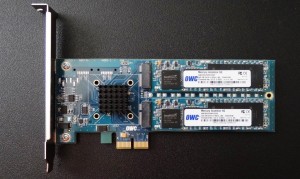OWC MERCURY HELIOS ON A PC
For our PC Testing, we wanted to know a few things, compatability of course being the most important but also, we wanted to know the limits of the Mercury Helios and Thunderbolt interface itself. For this reason, we couldn’t resist pulling side by side testing with the provided OWC Mercury Accelsior 120GB PCIe SSD as well as the Intel 910 800GB PCIe SSD we had in our labs.
Our initial concern with the Intel 910 was going to be overheating but this was quickly taken care of by the variable speed fan within the Helios itself.
TEST BENCH AND PROTOCOL
 Our analysis today will be conducted with our Asus Z77 Premium Test Bench….with Thunderbolt!
Our analysis today will be conducted with our Asus Z77 Premium Test Bench….with Thunderbolt!
In testing, our main objective is to obtain results as pure and as accurate as possible and we want to ensure that no anomalies slip through. Simply put, we want to provide you with the absolute best results the tested hardware can provide. Repetition in testing is standard and, if necessary, we may conduct specific tests in Windows 7 ‘safe mode’ to ensure the OS has little to no influence on the end result.
In order to validate and confirm our findings, testing is supported by industry accepted benchmark programs. All results are displayed through capture of the actual benchmark for better understanding of the testing process by the reader.
 We would like to thank ASUS (P8Z77-V Premium
We would like to thank ASUS (P8Z77-V Premium![]()
![]() ), Intel (Core i7-3770K
), Intel (Core i7-3770K![]() ), Crucial (Ballistix
), Crucial (Ballistix![]() ), Corsair (H100
), Corsair (H100![]() ) and Be Quiet (PSU/Fans) for supporting the build of our Z77 Premium Test Bench.
) and Be Quiet (PSU/Fans) for supporting the build of our Z77 Premium Test Bench.
BENCHMARK SOFTWARE
The software we will be using for today’s analysis is typical of many of our reviews and consists of ATTO Disk Benchmark, Crystal DiskMark, AS SSD, Anvil Storage Utilities and QuickBench. We rely on these as they each have a way of supporting one another yet, at the same time, adding a new performance benchmark to the total picture. Much of the software is free and can be downloaded simply by clicking on the linked title.
PCIE CARD INSTALLATION
Installation of the OWC Mercury Accelsior PCIe SSD was simple as it was a self contained RAID setup which could be configured to be a bootable device. It was simply plug and play. The Intel 910 was not as easy, however, as it is not a bootable device and could be configured as a 400 or 800GB unit. In fact, we discovered right off that we could have configured the 910 as four 186GB logical drives.

 The problem then became creating a RAID as the drives were not recognized in BIOS or through the Intel RST Control Panel, this being the result of the logical drives passing through Thunderbolt, no doubt. Using Windows 7 Storage Disk Management, we were able to turn all four drives into dynamic drives and create a RAID environment.
The problem then became creating a RAID as the drives were not recognized in BIOS or through the Intel RST Control Panel, this being the result of the logical drives passing through Thunderbolt, no doubt. Using Windows 7 Storage Disk Management, we were able to turn all four drives into dynamic drives and create a RAID environment.
The ideal part of this configuration was that the new volume was recognized after rebooting, something we were not sure of initially as the four individual drives were running through a single Thunderbolt cable. As well, the Helios turned on and off with the system even in PC mode.
 The SSD Review The Worlds Dedicated SSD Education and Review Resource |
The SSD Review The Worlds Dedicated SSD Education and Review Resource | 

800 GB/s or MB/s in the title?
Thanks…you know I have been working all weekend when…
yes scintest have 800 gb/s laser hard drive not releasing too puplic haveing a 800 gb/s laser hard drive in future game consoles be very fun
While prices remain high, Apple itself sells thunderbolt cables at $10 cheaper than the one you used: https://store.apple.com/us/product/MC913ZM/A/apple-thunderbolt-cable-20-m
hi there be fun having quadrupple 800 mb/s ssd in a ps4 xbox 720 or wii u 2